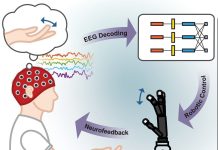
In a new study, researchers found depression is linked to areas of the brain shrinking in size, but when depression is paired with anxiety one area of the brain becomes “significantly” larger.
The research was conducted by a team at Australian National University.
Depression is the most debilitating disorder worldwide, and one-in-six Australians currently experience depression, anxiety, or both.
Many studies looking at the effect of depression on the brain do not account for the fact that people who have depression often experience anxiety too.
The team looked at more than 10,000 people to find the effects of depression and anxiety on brain volume.
They found depression has a pronounced impact on the hippocampus, the part of the brain linked to memory and learning, shrinking it.
This becomes even more relevant later in life because a smaller hippocampus is a risk factor for Alzheimer’s disease and may accelerate the development of dementia.
In contrast, when depression and anxiety occur together, it leads to an increase in the size of the part of the brain linked to emotions, the amygdala.
A particularly important finding of this research is that people who had both depression and anxiety had less shrinkage in many brain areas and even an increase in the amygdala.
This indicates that the true effect of depression on the brain has been underestimated because of the opposite effect in the amygdala.
The team says anxiety may lower the effect of depression on brain volume sizes by three percent on average—somewhat hiding the true shrinking effects of depression.
More research is needed into how anxiety lowers the effects of depression, but for the amygdala, perhaps anxiety leads to overactivity.
One author of the study is Ph.D. researcher Ms. Daniela Espinoza Oyarce.
The study is published in the Journal of Psychiatry and Neuroscience.
Copyright © 2020 Knowridge Science Report. All rights reserved.



